
Unofficially obsessed with Google.
Google Trends is your personal Zeitgeist
12/21/2005 12:38:00 PM
Deftly capitalizing on the hype and press of its release of the 2005 Zeitgeist yesterday, Google today sedately announced on its blog that it is providing a diluted version of these Zeitgeist stats for individual users. Log into your personal search in Google, then click Trends in the sidebar.  You can view your top queries and clicks as well as monthly, daily, and hourly search summaries. Top 3 searches for these increments are also available. There is also a feeble Amazonian mentioning of queries that people with similar searching habits have searched.  Clearly, my suspicions that I am an insomniacal Internet user are confirmed! I was surprised to see that my top 2 searches are related to the MTA in NYC (subway and Metro-North schedules), which means I should probably bookmark those pages rather than search for them so frequently! I was a bit confused to see Six Apart as my "top site" as I rarely visit the domain. I do a great deal of publishing on Movable Type, however, so predict that this is the link. (Although none of my MT activity is redirected from a Google search or other aspect of the Google domain...) Strangely, I did not see the site that I use every day in my work mentioned anywhere in these lists, as if it's been discounted for being so incredibly pervasive in my activity. (Again, I don't often view that site as a direct link off of Google, so perhaps that is explanatory in some way as well...) Disappointingly, these stats are still rather void of numerical usefulness. For instance, the top ten lists are not labeled as "top ten for the month" or "top ten for the day," so I have no relative idea of what these superlatives represent. I would also like to see my average number of hits on Google per day (just how many searches do I usually conduct) and the average amount of time I spend on the Google domain. I am left to assume that the numbers capping the bars on the graphs represent "number of searches," but I have no hint as to whether this accounts for multiple searches for the same term or dozens of hits on the search pages for a single term. Interestingly, and as one might have suspected, Google has been collecting this information for nearly as long as it has offered personalized search (perhaps longer). Query information is available for review back to August (in my Trends summary, yours may be more or less inclusive). Lastly, this is only useful so long as users are signed into their Google accounts during search activities. I sign in and out of several Google accounts per day (to check my Gmail addresses), and so my personalized search information is dispersed across several accounts and/or not recorded in the event that I have signed out of all of my accounts. I will give Google tremendous credit for giving me one of the most effective encouragements yet to remain logged into my Google account. These trends, as elemental as they are, still hold quite a bit of interest for me as a frequent searcher. I will definitely be revisiting and crossing my fingers for updated analysis. I'm hoping for a summary utility combining the ease of use of Site Meter and the query information of past years of the Google Zeitgeist. Link to another searcher's revelations: " Things I've Learned from Google Trends" by Brian Vargas.
AOL deal means Google Talk synchs with AIM
12/21/2005 12:13:00 PM
I've been avoiding discussing the AOL deal due to massive media coverage, but a recent Google press release has given me something to exclaim over. (One billion dollars was definitely something to exclaim over, but it was mostly just terrifying considering the purchase property was AOL.) Google announces a subtle detail in the Time Warner AOL + Google deal: the synchronization of Google Talk and AIM. The press release remains vague on the specifics of this link, stating only that one of the agreement's features is "Enabling Google Talk and AIM instant messaging users to communicate with each other, provided certain conditions are met." So what are these conditions? My first estimation is that in order to synchronize with Google Talk, the user must also be a paying AOL subscriber (or at least an AIM subscrber). Alternatively, the condition may be an acceptance of AOL-provided or targeted advertising on the Google Talk interface. While I am leery of the necessary conditions for synchronization, I am hopeful that this could be a step toward creating Google's version of a Trillian application--the messaging client that combines the features and accessibility of multiple programs.
"Yahoo! poaching Google users?"
12/20/2005 11:58:00 PM
Firefox lets you choose your toolbar search engine by selecting from a list, but Google is pre-selected as your "first choice." Via a post on Digg, it looks like Yahoo is striking out at this defaulting and suggesting to any Firefox user who loads the Yahoo homepage: "Search with Yahoo! right from your browser." Screenshot of the offending rolldown layer below.  If you note, the layer is of course coded on the Yahoo homepage, but looks like a merging of grey and rounded-edge Firefox system design and the Yahoo purple. But the real question is, what on earth is that yellow jokester being stroked by a Mickey Mouse hand? Including a popup on the Yahoo page is quite the giant step in Yahoo's attempt to reclaim search. I'm bowled over, frankly.
Google Modules gathers modules for the Google Homepage
12/20/2005 10:58:00 PM
I earlier wrote about the Google Homepage API and mentioned its insufficiency of applicable modules. The honorable Philipp Lenssen (of Google Blogoscoped) and his associate Alex Ksikes have put together a gorgeous new listing of available modules-- GoogleModules.com. The design is sleek and the interface intuitive, a simple download directory of currently available modules. An excellent response to Google's inability to add new modules to the module directory in a timely fashion. Gracias, Philipp and Alex.
Google releases Zeitgeist 2005
12/20/2005 09:44:00 PM
Google has released the 2005 Zeitgeist, and it is a splashy summarization of the year's top search trends. With new graphs, paragraph reviews, and tabbed title bars, Google has created more of a pamphlet than its typical list review. (This design style is in line with its recent design for new product introductions and support pages, see Google Analytics for another new mode of Google design.) The Googlist interprets this as a step toward legitimizing Google's information in the eyes of potential "customers." That is to say, Google may eventually package information and sell it in similarly niche packages for industries. But enough with that surmising on my part, let's get down to the rankings! The first pieces of information are provided in easy list format with no supporting numbers given: Top Gainers of 2005It's no surprise that Myspace takes it all here. The lewd personal profile site has at times had more pageviews than any other web entity, even Google. Google's own orkut taking #5 in the Top Gainers category, however, seems highly inaccurate. But who are we to judge? Top Google News Searches of 2005Janet Jackson beats out Hurricane and Katrina to round out the top 3. But we already knew the world was superfluous and other-obsessed in all of the wrong ways. No surprise that the year's other top headliners Xbox 360, Brad Pitt, Angelina Jolie, and Harry Potter file in below to create the top 10. Top Froogle Searches of 2005Unquestionably the ipod products and various digital camera and gaming devices fill the top 10. Awkwardly, however, "computer desk" has managed to slide in at #9--a feeble attempt at purchasing productivity in an otherwise entertainment dominated category. Subsequent information is provided in an attractive line graph format comparing search terms across time. Although no Y-axis labels are provided, that metric is something similar to "# of searches per day" or "# of unique IP addresses querying the term per day." We really have no idea... What we do know is that the Google web design team doesn't quite have their image alt tag thinking caps on. The mouseover tool tips for a lot of the graphs have erroneous tidbits: 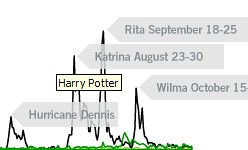 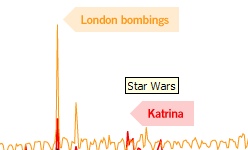 Hah! Bizarre, on to the query roundups: World AffairsGoogle selects the London attacks, weapons of mass destruction, the Pope's death, Rove's CIA leak, and Rosa Parks as five news stories (notably Western in concern) exemplary of search spikes and trends. Expectedly, searches follow the passing of newsworthy current events with traffic increases as one might expect. Unexpectedly, I was surprised to see that in its news provider comparison, BBC searches outnumber CNN searches by nearly 50%. My estimation for this disparity is the dispersal of American news sources across a variety of trusted sites (NYT, MSNBC, etc.) while the BBC has managed to nearly monopolize the European news sector. Google's summary of ths section is a rather benign and uninteresting statement: "In tumultuous times, people turn to news sources to track events." Oh? NatureThe Zeitgeist analysis here focuses on the hurricane and tsunami disasters with brief commentary on the avian flu. No comparisons to other current events are made, so it is unclear on what scale Google considers these searches to be notable. How did the term "Hurricane Rita," for example, compare to the earler discussed "weapons of mass destruction" in search popularity? We are left unsure. MoviesIt's a bit upsetting that our global culture finds so much searchable interest in movies that Google felt the necessity to create an entire category (following the natural disaster category just previously) to discuss the relevant trends. Summary from this section: "The Force" beats "The Dark Side" with triple the search interest, "Yoda" was more often searched than "Skywalker" (either Luke or Anakin), Harry Potter drew competing book and movie searches, Harry Potter terms beat out Lord of the Rings terms, and apparently March of the Penguins made quite the search splash. Clearly Zeitgeist writers found Star Wars to be the most interesting fodder. CelebritiesAnother fluff category, but validly so as the top gaining and top overall searches include numerous celebrities (so help us in our cultural recession). In sum: Britney is still the Internet's pop diva, Jennfer Aniston loses out to both Brad and Angelina in search popularity, Martha and the Donald duked it out for Apprentice prominence, and no one cares about Camilla Parker Bowles anymore (or Prince Charles). PhenomenaPerhaps the most "timely" of the categories, showing how queries distinctive to this particular year fared in popularity. Conclusions: Black Friday is a purely seasonal interest, surfing beats skateboarding which just beats out snowboarding, this was the "Year of the Wiki" for Wikipedia but noticeably there was no true spike during the recent Wikipedia scandal, and podcast made a tiny showing while ipod and mp3 continued to sail steadily through the search field. While I love piecing the year together through the Zeitgeist, I found Google's fluffy graph analyses to be misrepresentative. Axes were obviously not to scale across all graphs which would lead many readers to think that "Karl Rove" and "The Dark Side" were similar performers, when in fact let's hope for the sake of all too perfect irony that they were not. Would love to see actual numbers on these, Google. Update: Google HTMLers fixed the alt image tags so they now correspond to the graphs, rather than to pop culture phenomena Star Wars and Harry Potter...
Search is a form of intelligence
12/19/2005 11:29:00 AM
Elizabeth Weise of USA Today suggests to us this morning (in an article with well-meaning but unsuccessful focus), that Google is replacing our long-term memory. Unfortunately, she spends much of the time sounding amazed that someone would think to search Google for a recipe or country capital before turning to a recipe book or encyclopedia. Despite her luddism, Weise does excite an argument that has increasingly frustrated my trust in the U.S. education system--it stems from her assertion that Internet users are more likely to quickly research the answer to a query than to retrieve it from or install it within their memories. Throughout my schooling, I recall being tested nearly 100% of the time on how accutely I could recall a fact from memory. While I put myself to work memorizing for those tools of the teaching system, I always felt jaded in that an entire aspect of my intelligence was being shorted on what should have been high marks. It irked me that the kid with the mindless ability to replicate a piece of paper in his head after staring at it while studying for an hour would always win out over the student who could track down the same information and present it keenly within 2 minutes of being asked (using Google, a reference library, or any other compilation of sources). There has always been an inherent bias toward rewarding replication, rote memorization, and what I often heard in the classes themselves, regurgitation. I even sat for "regurgitation quizzes." Never was I given what to me would be a more appropriate estimation of total understanding--a research test. How aptly can you wield the sources at hand and provide a holistic or detailed solution to this query? There is a significant level of fact relating, problem solving, and solution creation that takes place in the event of a layered search project. You may say "hey, that's a research paper, idiot!" but to that I say, then why is the focus of 75% of those exercises grammar and style? There's a place in our education system for encouraging and rewarding the ability to accumulate a base of knowledge, regardless of one's ability to correctly punctuate appositives. (This is not to denounce the importance of grammar. It is just to point out that the focus of other coursework should be more substantive than it currently is.) I've always thought that "resourcefulness" would be an excellent addition to the current categories of scholarship rewarded in education. My hope is that Google's overwhelming revolution of the way students develop will eventually permeate the teaching side of education and bring us an entirely new style of learning. Let's hope that someday we're hearing our kids talk about their latest Google test! Maybe then these schools would be churning out real geniuses rather than fact-spewing idiots.
Switching to Gmail
12/19/2005 11:18:00 AM
Not sure how long this Switching to Gmail page has been lurking in the Gmail support base, but Lifehacker exposed it today. And if this February 2005 study by ReturnPath continues to predict the switching, most users will be abandoning Hotmail in order to sign with Gmail. Similarly, I switched from Hotmail in the summer of 2004 when Gmail first surfaced and have since condensed my dozen superfluous email accounts from spurious providers into a trio of compartmentalized Gmail accounts. Gmail's providing this feature is almost more out of necessity than marketing (although of course, it's never far from the latter).
Opera CFO denies Google acquisition rumor
12/15/2005 02:01:00 PM
Opera CFO Christian Jebsen has quashed the rumor that Google and Opera are in collusion talks. The rumor has doggedly persevered through blogs across the net, apparently having originated in ex-Yahoo Europe president Pierre Chappaz's blog. He writes, (translated from French), "According to a very well-informed source, Google is on the brink of purchasing the Opera browser." He accompanies it with a terrifying word assimilation: "operagle." Considering that Google just announced new extensions for Firefox, that Google's search toolbar is integrated in the Firefox browser itself, and that Google is the default home page for Firefox, it's just absurd in my estimation that Google would trounce its high-profile relationship with Mozilla in order to purchase Opera. Much better to be a "hanger-on" for what is fast becoming the world's most adored Internet surf tool than to be the owner of a tech browser that most people outside of Slashdot have never heard of. Thank you, Christian Jebsen, for humbly admitting that Google has no interest in acquiring the Opera organization. Also thank you, Joe Clark, for your honesty, "Google wants to get in bed with these people? I think not."
Gmail sends you on vacation
12/15/2005 01:16:00 PM
The Googlist dreams of taking more vacations, but frankly, that's just delusional fantasy on my part. Instead, thanks to Google's introduction of Automatic Vacation Response for Gmail, I can now pretend to take vacations. The setup is simple, just go to Settings > General, and then merrily scroll down the page. Enter tantalizing descriptions of your destinations and stunts, then designate whether or not only Contacts should receive the message.  I'm thinking of just having this activated all the time with obnoxious quips about pig roasts in Fiji and the pressure of the altitude on my lungs in the Andes. Feel free to write and see what I'm up to. In addition to free vacations, Gmail has also introduced a group email function. An excellent description of these new features is available here, which I found via Unofficial Google Blog.
Woot or Yahoo? Guess who's number one on Google?
12/14/2005 08:51:00 PM
Who googles "Google"? Well, I'd have to say that plugging "Google" into its own search engine without any accompanying modifiers is not a search I do regularly. But today I did it (mostly to check on the number of hits, currently around 753 million). The Adsense bids in the accompanying right column, however, were the real folly--whoever googles "Google" is in for some mind games:  Woot Woot, the one-awesome-product-a-day gadget store, seems to have nearly a 100% share voice on the AdWords keyword "Google." Their ad popped up effortlessly in Position 1 for all of my refreshes of the page. Their tagline is "Filthy rich? We'll help" which is quite the appropriate reference to Google's skyrocketing stock price and subsequent millionaire-creationism. Woot's cheeky ad strategy is confirmed when Woot again pops up in near-the-top positioning for searches of Google's stock ticker "GOOG" and again at Position 1 for the phrase "Google stock." ++Woot for its sly suggestiveness. Close contenders for Position 2 in the "Google" keyword were proxyconn.com, dreamkitty.com, and submiturl.blogspot.com But only one site outranked the underlings in maintaining the highest share voice in Position 2. Who else but Yahoo? The perpetual Number Two. Makes me wonder if Yahoo is somehow blocked from ever attaining Position 1, regardless of how much they bid for that slot in AdWords. I find it highly doubtful that Woot could maintain such an expensive campaign at 100% share voice as I'm guessing that the CPC for keyword "Google" is a far cry from the 5 cents minimum bid.
Google is not "the man"
12/14/2005 07:24:00 PM
In case it wasn't already obvious that Google is an enormously successful corporation that doesn't consider itself anything of the sort, its bloggers report that Google is indeed something quite different than that faceless corporate figure: "the man." In suggesting a shortcut to customer service phone numbers for bureaucratic corporations, Google bloggers write "OK, here's a secret "the man" doesn't want you to know. Some companies have a toll-free number that's buried deep on their website -- but it would take like a thousand clicks to find it, and these days, who has the time? One way to get to it more quickly is to search Google for the company name and the phrase "customer support." Like this: TiVo Customer Support. So I did the same search for a different large corporation: Google Customer Support. I think I had to jump 6 or 8 pages in search results before finding anything useful for contacting Google. But in all fairness, the search results may be ironic but the information is easy to come by. Just 2 clicks from the Google homepage is physical and virtual contact information. I suppose the right message here, then, is that Google's customer service is the model of accessibility: it's so easy you don't need to search! Despite the irony, I continue to appreciate that the underwriting motto of all Google operations is transparency. Now here's the Google phone number for your quick reference: 650-253-0000. Any reports out there on efforts to call this number? Note: When I need such customer service numbers, I usually turn to this forum thread on Fat Wallet. Of course I found it through a Google search, long long ago.
Google takes a turn for TV with NOVA commercial
12/14/2005 12:13:00 AM
Via ZDNet's Google blog, the first known Google TV commercial is attractive screen candy. The spot feels like a trip through the galaxy with a search field populating with "egyptology" and then panning video of pyramids. To further titillate the explorer in you, the search field then populates with "astronomy" and zooms into a starry space scene followed by a sedate image of the Google homepage and the search field populating with "NOVA."  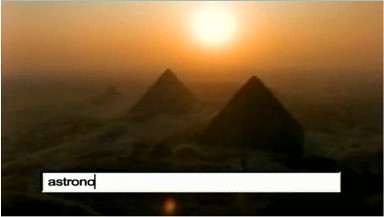  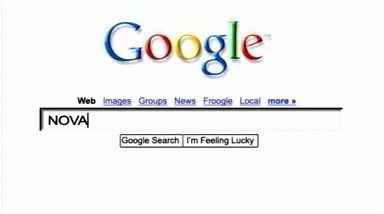 I think it's easy to see that a NOVA sponsorship is an appropriate placement for Google and just happens to be a convenient way of making a baby step into capturing an audience from a new medium. Other similar comments are available in this discussion of the ad spots. NOVA targets well-educated and deep-pocketed middle-agers, and so a sponsorship by Google of this program is really just a way of pointing out to this audience sector that Google can bring them the same kind of exploration that NOVA does. If ever Google were to take that step of a first advertisement on a medium, then this is the way to do it: sleekly, responsibly, and with targeting that doesn't waste a dollar.
Google Homepage API takes on Yahoo Widgets (and Microsoft Gadgets)
12/13/2005 11:02:00 PM
Borked by Yahoo's takeover and subsequent re-relase of Konfabulator as Yahoo Widgets, Google has had a bit of catching up to do in the user-customization area. Even Microsoft has had its Microsoft Gadgets without Google suggesting a competitor. Google has finally responded in its latest Google Blog post with the announcement of the Google Homepage API. (Yes, they've had customizability with Google Desktop, but that wasn't quite in the same vein as Widgets/Gadgets/Dashboard.) On first glance, the Google offering seems shoddy. All that's currently available are a time module, an eyeball module, a Google maps weather module (which has been far outdone by individual Map mashers), and some useless other modules. Yahoo's (ex-Konfabulator) Widgets are the most useful things after Firefox extensions with search mods, GTD mods, MP3 mods, and any number of other useful widgets. On second glance, the Google Homepage API release will probably mean extraordinary things in terms of developer response and eventually evolution of module capacity. For non-developers, if you're willing to sit on your hands for a bit, I bet we'll see some elegant little applications popping up in the module directory. So, developers get to work! For non-techies, Google suggests that you can start by making your own with the traditional first programming project's "Hello World" output. A couple of other quick comparison notes: Google's modules are intended for inline rendering on the personalized Google homepage. Yahoo's are take-along desktop modules. Each has his own estimation of what's more convenient in the long run, so pick and choose as you will. But unless developers can move the Google modules off the homepage, then their usefulness is only as strong as users' desire to use the personalized Google homepage. Also, in terms of pure aesthetics, Yahoo's Widgets are based on Konfabulator's bubbly/chromey/machinistic styling while Google's concept here is its familiar "no design is good design." For GTDers, that simplicity might appeal more while for the younger video game crew, the Widgets will better suit. Next, Google takes a real loss here in the naming race. With Yahoo already squeezing out Widgets and Microsoft creating Gadgets, Google could have at least done "Mods" or "Gizmos" or found some other cute and familiar name for these things. This is an uncharacteristic naming misstep for Google, but one I think that was made out of necessity in order to keep from sounding like a Widget/Gadget wannabe (and also to make it seem more like a developer opportunity than an entertainment subcategory). On a positive note, Google wins in the accessibility category with Google modules open to users on all platforms--Yahoo's are open to users who take time to download their Widget app and MS Gadgets are only useful to surfers who like Windows-centric Live.com. Most people use Google independently of their operating system preference, so, ++Google in that regard. It will be interesting to see how quickly Google's module directory will grow. The process for seeing a new module to completion is creation, submission to Google for review, and then hopefully approval and addition of the new module to the directory. No word on what qualifies as a good or useful module other than the coding requirements of robustness and security. If they can speed things up a bit better than Firefox's extensions gallery, then they've got a sure winner. My bet is that they have a couple dozen backloaded and ready to pop up in the directory at timed intervals over the next few weeks (in order to provide function while developers get their feet wet). But, I for one, welcome our new Google API overlords. Here's to hoping some amazing tools surface as a result.
Does Alexa's Web Search Platform threaten Google?
12/13/2005 06:00:00 PM
Richard MacManus astutely posits that the opening of Alexa's backend API to developers will probably have little to no effect on Google's share of the web. To remain competitive with the freedom allowed to Alexa developers, however, MacManus recommends that Google move toward loosening its API restrictions to developers. web2.0blog wonders what new tools the Alexa opportunity will inspire. And in a plea for adding usefulness rather than just a competing search applicance: "If you think that the service is just good for creating mini-search engines then you will probably fail in creating anything successful." Speaking of Alexa v. Google, I use a Firefox extension called GooglePreview which places relevant website preview thumbnails provided by Alexa next to each Google result. While GooglePreview is nowhere near as powerful a solution as could be created by mining Alexa's new data resource, it certainly is an example of an instance in which Alexa's data could be tooled to create an apparatus ultimately more useful than Google's search. (This is not to say that Google couldn't quickly provide this thumbnail service itself, just pointing out a difference between the two resources.) In sum, this should just fuel Google to produce "something better." What that something will be, and even what contenders Alexa's platform offers will be quite the exciting time in search development. Update! A few hours after the Alexa announcement, the Official Google Blog had this to say: "Oh yeah? Well, build your own Google homepage." Pretty quick announcement (and not many apps to show for it) for the Google Homepage API and a very speedy (semi-response) to the increased developer capabilities recently announced by Alexa. The best app so far? "Eyes" that follow your mouse cursor around. Not that there's anything useful about that. Should be interesting to see where these "widgets" will go. (Yes, I just referenced Yahoo's new widgets. More on those in the next post...)
Gmail Manager Firefox extension for multiple Gmail accounts
12/13/2005 01:01:00 AM
After the big upgrade to Firefox 1.5, we are all scrambling to update existing extensions and see what's new. I am quite pleased with the updated Gmail Manager 0.4, created by Todd Long. I have several Gmail accounts and dislike logging in and out of each of them in order to view messages for every account. Gmail Manager takes that multiplicity of actions and streamlines them into an elegant notifier in the status bar. Clicking on the notifier looks something like this:  You can set Gmail Manager to automatically login to each account and create alerts for new mail such that one click on the notifier will give you a list of your accounts and the subsequent will open the inbox. Happily, there are a good number of options to customize for Gmail Manager like exactly where you want to place the notifier and how it should respond when opening your Inbox:  Heavenly idea for an extension, thanks, Todd.
Find all unread messages in Gmail
12/12/2005 11:11:00 PM
If you're like me, you probably have a few messages lurking in your Gmail Archive that you forgot to read. These are the wayward emails which you never read and never labelled. (All unread messages that are labelled are counted and listed next to each label.) The lefthand Gmail sidebar will not display the number of unread messages for All Mail, however, so you need some way of uncovering unlabelled, unread messages. To uncover these hidden archived messages, simply search "is:unread" in the top Gmail search field.  You'll be presented with every single unread mail that is stored on your personal Gmail server. You can also perform this search by clicking "Show search options" to the right of the search field and selecting Unread Mail in the dropdown box on the next page. Then click search and you're again presented with all of your unread mail. For a full list of Gmail operators, see Gmail's Advanced Search Operators.
How to mash with Google Maps
12/12/2005 09:49:00 PM
Google Desktop adds del.icio.us plug-in
12/12/2005 07:54:00 PM
Fresh from the official Inside Google Desktop blog, innocence marches on in the form of a new del.icio.us plug-in for Google Desktop that loads and sorts del.icio.us bookmarks. With Yahoo's recent acquisition of del.icio.us just days before, you would think that Google would silently boycott all Yahoo-owned projects rather than announce GTD tools for them through the official blog. But instead, Google is taking the "who gives a damn, we're gonna create the best damn net experience" approach to improving their projects. I applaud Google's damn-it-to-hell confidence in the face of direct competition! It's interesting to note that Google's Stock Quote feature, which I wistfully discussed previously, redirects to a group of finance sites, the primary source being Yahoo Finance. Another instance of their upfrontness about the best information always trumping, regardless of its source. Oh, and don't forget they have that really tongue-in-cheek yet unavoidably honest link on the Official Google Blog under "What We're Reading": Yahoo Search Blog.
Google Holiday Party 2005
12/12/2005 03:45:00 PM
    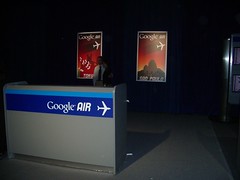 A friend of a friend of a friend of mine was a guest at a Google Holiday Party this year and reported it was an enchanting time. The theme? "Jetaway on a Google Holiday!" Revelers arrived at the Pier 48 complex and were greeted by Google AIR check-in desks. After checking-in and receiving boarding passes, guests were then "flown" around the world to places like London, Dublin, Sao Paulo, Tokyo, and Bombay. Apparently there was lots of world cuisine and random hired capoeira, karaoke, and dance entertainers. The Googlist is a bit jealous of this "friend." Oh, and two more words: Open. Bar. Photos of the bash are available here, here and here. Also blog posts here and here
Still waiting for Google Finance
12/12/2005 04:55:00 AM
Because of its simplistic stock tracking, Yahoo Finance has managed to grab about 5% of my daily surfing time. Each day when I load the portal, I'm silently asking the question "When the heck will Google get on this Finance thing?" I would so love to use Google as my primary financial research tool, simply because I know they would make it clean, speedy, and supported by customizable charts and RSS feeds. (Well, I would hope so, anyways.) It's been months since the first big Google Finance rumor circulated the net as a result of insider speculation at SiliconBeat. Google has also had its own subtle Stock Quotes feature for nearly a year, which returns a basic chart and numbers for queries containing a stock quote. How much longer will we have to wait for Google Finance? Oddly enough, my premonitions tell me it might have something to do with the much talked-up Google Wallet. Personal finance tracking at its most micro and macro levels (unless of course "Wallet" is Google's do-no-evil term for "Finance" meaning they would be the same project).
GOOG to join NASDAQ-100 stock index
12/12/2005 04:21:00 AM
The NASDAQ Stock Market announced on Friday that Google will be added to the NASDAQ 100 on December 19, 2005. (Also included in this addition are Monster.com and Expedia.com.) The NASDAQ 100 (QQQQ) is comprised of the 100 largest non-tech companies (that are not finance companies). With Google stock having dropped regularly over the past week, this will be good news for GOOG shareholders. Why? Because the NASDAQ 100 index fund "is the most actively traded equity security listed in the United States" and its fund holders will be effectively forced to purchase Google stock when it joins the fund. This could send GOOG inching up a bit more than normal towards the latter half of the month. Congrats, Google!
Yahoo snags Six Apart hosting deal
12/12/2005 02:50:00 AM
Reuters announces that Yahoo wants you to move your type over to its servers, and to do that they've created an exclusive deal with Six Apart's Movable Type to be their recommended small business host. Google's Blogger is primarily a personal blog tool, so the deal does not directly affect its bloggers. This bit of news reinforces, however, the earlier projection I made that Yahoo is eyeing the web's intelligent users as the necessary capital for building a net company on par with the perceived intellectual status of Google. MovableType is considered amongst bloggers and web publishers to be the premiere (though now being challenged by WordPress) professional publishing tool available. More generally, it seems Yahoo's growth strategy as of late is to attach its name to successful web entities that are already in existence rather than attempt to copy them as new Yahoo projects. Seems smart in some senses, but not quite in line with Google's higher-brow vision of creating and innovating its products.
Cool Google Maps
12/12/2005 02:24:00 AM
Yet another kid (see the Google Maps Mania) is scouring the net for every possible Google Maps mashup. He calls the resulting blog what else but Cool Google Maps. At first only useful for those days when nothing but a proximal Japanese castle or Velodrome cycling arena will do. But here are some gems from the archives: Most useful Google Map: Craigslist Housing Map which seems like the most logical way of finding housing anyway. Most terrifying Google Map: MySpace User Map each MySpace person on the map represents a zip code rather than a single profile, so be sure to scroll down when viewing a map detail.
Yahoo buys del.icio.us to capture smarter, richer Google users
12/12/2005 12:44:00 AM
We've all heard it: Yahoo bought del.icio.us! Much more than the large-web-corp acquires independent-techie-user site, this acquisition is about recharacterizing Yahoo's public image. The Yahoo buy was actually a bid to slowly capture Google's more sophisticated user base. Ironically though certainly not causally, the Yahoo.icio.us deal was sealed one day after Yahoo News itself aggregated an article headlined " Study: Google users wealthier, more Net savvy." The article made the blog rounds and was even Slashdotted. In it, researchers concluded that 52% of respondents chose Google as their search engine of choice, and that net users in this sector of the sample were more likely to make over $60,000 than in other sectors of the sample. We can all sit here and question the merits of the study or we can just fess up and admit that we all know that Googlers tend to be more information-driven and tech savvy which generally correlates to income and intelligence. This has been obvious to most of us for a long time. Although the article seemed really late (and culturally unaware) in pronouncing Yahoo merely a tweenster rival to well-read, adult Google, it highlighted the distinction between the user bases at precisely the moment that Yahoo was fighting to lessen the gap. Its buyout of del.icio.us closed the deal: Yahoo is officially searching for smarter searchers. Yahoo's other recent acquisition, the social photo tagging/hosting service, Flickr, was an unmasked attempt to bolster its position in the schema of relevant internet applications. The one failure with Flickr is that all of the early-adopters and tech savvy users whom it hoped to capture with the deal had already been longtime Flickr users and therefore were not forced to create Yahoo accounts in order to use the application. Regardless, it was a step in the right direction for the company in perpetual adolescence. The silly thing in all of this is that while del.icio.us has always been lauded for its easy to wield technology, the buyout had nothing to do with acquiring a technology. And for that reason, I anticipate that Google has, somewhere down the line, plans to integrate a bookmarking/linking system into one of its existing applications. Perhaps somewhere in the personalized Google search or Gmail, even. For now, though, Yahoo users can still pine for their 21st birthdays, as they're nowhere near having drinks with the big boys (who just happen to have bigger brains and fatter wallets).
Snapshots in Google history 1999
12/11/2005 10:47:00 PM
Tracing Google circa 1999 with primary source assistance from the Internet Archive. 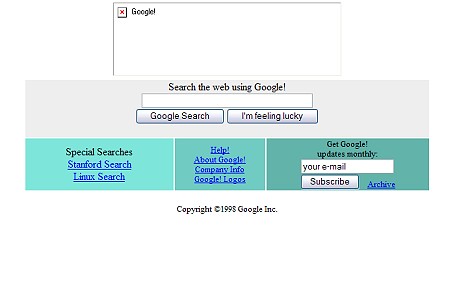 December 2, 1998 December 2, 1998 finds the unlikely startup in a yucky teal phase that barely lasts a few months. It's entirely too hideous to like at, but it does offer some promising features. Immediately from inception, the simple formula of a centered logo and search box are native components to the Google flagship. Also foreshadowed here is Google's University Search (Stanford, anyone?) and what is today's Google Friends Newsletter (for which the rudimentary April 1998 issue is still available). And not that anybody is sad that this is gone, but here's some of that last vestige of Google's original exclamation mark logo. But they, unlike Yahoo, would eventually kick that late 90's Internet hype in the balls with a play for real users and serious money. 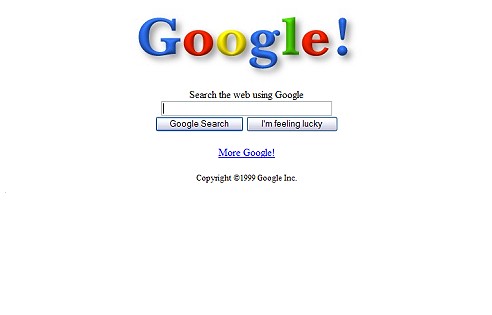 April 28, 1999 April 28, 1999. finds Google wiser and less turquoise. This is the Google, that will always be the search home page's archetype. Everything you need is here: centered logo and search field, one search button, one lucky button, an enticing link to more features, and the requisite copyright statement. All else will just be fluff, well, except for all that useful stuff that eventually comes along like Image searching... but you get the idea. Google admits that this fat beta logo was a mistake, but it sure is fun to see it in place. All retrofitted and exclamatized. Terrifying, but not as terrifying as it could have been. (For some reason, Internet Archive can load this logo image for a split second before returning an image not found blank field. I sat here for 7 minutes trying to capture it with Alt + Print Screen, and finally succeeded.) 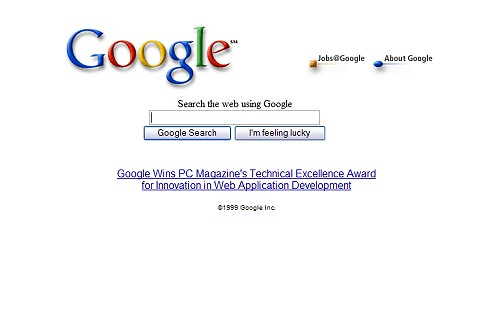 November 29, 1999 November 29, 1999 says hello new logo! A crisp new serif font (Catull) is in place along with enterprising new links for Jobs and corporate info. We even see that Google has won a PC Mag award! Hooray! It's just the beginning of a half-decade of ruling the world. But the real hottness will be when the G kids get it together and shove that logo back to the center again. Left-leaning media? They won't admit to it!
G-Write : one click to compose in Gmail
12/11/2005 09:41:00 PM
G-Write is a click-to-compose tool for Firefox and Gmail users. It's basically a dumbed down version of G-Link that quickly opens a blank message in Gmail, ready to be composed and sent to whomever you wish.  To get started, simply drag the link below onto your Firefox bookmark toolbar. G-WriteNote that you can also use G-Write to start composing a draft and save it for later like you would in the regular Gmail interface. Great for on the spot thoughts that don't yet merit full emails.
G-Link : send quick bookmarks to your Gmail
12/11/2005 08:54:00 PM
There are a variety of shortcuts to using Gmail for bookmarks, but G-Link, which creates a bookmarklet in Firefox, is how the Googlist does it.  It's a personalized version of the GmailThis! bookmarklet, made even more useful by this post on Lifehacker. (This is for Firefoxlings only, kids!) For this to be useful, just make sure you're always logged into Gmail under your own email address (otherwise you have to login every time to create a bookmark). To install G-Link yourself, simply drag the link below onto your Firefox toolbar. G-LinkNext, right-click on the G-Link bookmark you just created and select Properties. Cursor across the location field until you find HEYDUDE@gmail.com and replace with your own Gmail address. This autofills your address in the To: field for every bookmark you send. Now all that's left is customizing Gmail. Open up that sucker and create a new label called "G-Link." Then create a filter for all email that meets these criteria: from your email, to your email, has "G-Link" in the subject.  Then tell Gmail to let all those emails skip the Inbox and go straight to your G-Links label. Now you're ready to see G-Link in action! Simply find a bookmark-worthy page while browsing in Firefox. Select any interesting text if you like by highlighting with your cursor, and then press the G-Link button on your toolbar. A window will open up addressed to your own email with the title and subject fields populated with the page title, link, and any text you selected. Press send and the temporary window flies away. The next time you open Gmail, you can click on your G-Links label and find your new bookmark! Simple, fun, G-Linking. (Also see my other personalized Gmail tool, G-Write.)
Choosing the Googlist name
12/11/2005 07:33:00 PM
Things to consider when naming a blog are
- Is the identical domain name available as a .com? Secondarily, as a .org or .net?
- Is it short enough or cute enough to be memorable?
- Is it spelled how it sounds and is it easy to spell?
- How sexy does it look in your favorite fonts?
Etcetera. In the process of sifting through name prospects, I for awhile relished the idea of Googlish. "Google-like, similar to Google, encrusted in the ancient odors of Google." It just sort of sounded cool. Plus it was cute, memorable, phonetic, and all of those other optimal attributes. But sadly, the domain name had been wrested from my grasp. Even more tragically, Googlish.com was about balloon hats: 
Creating the Googlist Logo
12/11/2005 06:30:00 PM
Google's font (having been chosen before G would understand the value of branding exclusivity) is publicly available as Catull for $99 or for free, depending on your scruples. Not one to brandish either a wallet or questionable morals, I opted for Googlefor--a site that obediently creates Google search portals complete with personalized Google-fonticized logos. (Quick Technorati and Google searches revealed that the link hadn't been well distributed yet, hence why my Googleified webhabits hadn't yet discovered it. It had really just popped up in some self-links from its founder, primarily on Digg and some relevant blog trackbacks. Also, it's not to be confused with the less well-executed Logogle. Anyways...) So, I promptly put Googlefor to work. "Make me a Googlist logo!" I commanded. And it worked its magic:  "Agreeable," I said, "even impressive." But the bot had mixed the colors up. The traditional Google logo is blue-red-yellow-blue-green-red. So I instructed Googlefor to make me some additional letters so that I might edit the logo into sublimation:  "Super!" I stroked my editing skills. Now for some thinking. The thing looked like a damn Kinko's experiment, a regular copy (not that I had qualms about that in any other area of this site.) So, I wittily employed a color trick! I greyed out the -ist, thinking I could say that Googlist is a detached source of news and analysis on a colorful entity. Yes, the logo would even have intelligent design! All that was left was slapping on "Blog" in Google's favorite sans-serif font, resizing appropriately, and popping out the logo baby:  Thus was Googlist released upon the world.
|
|






























